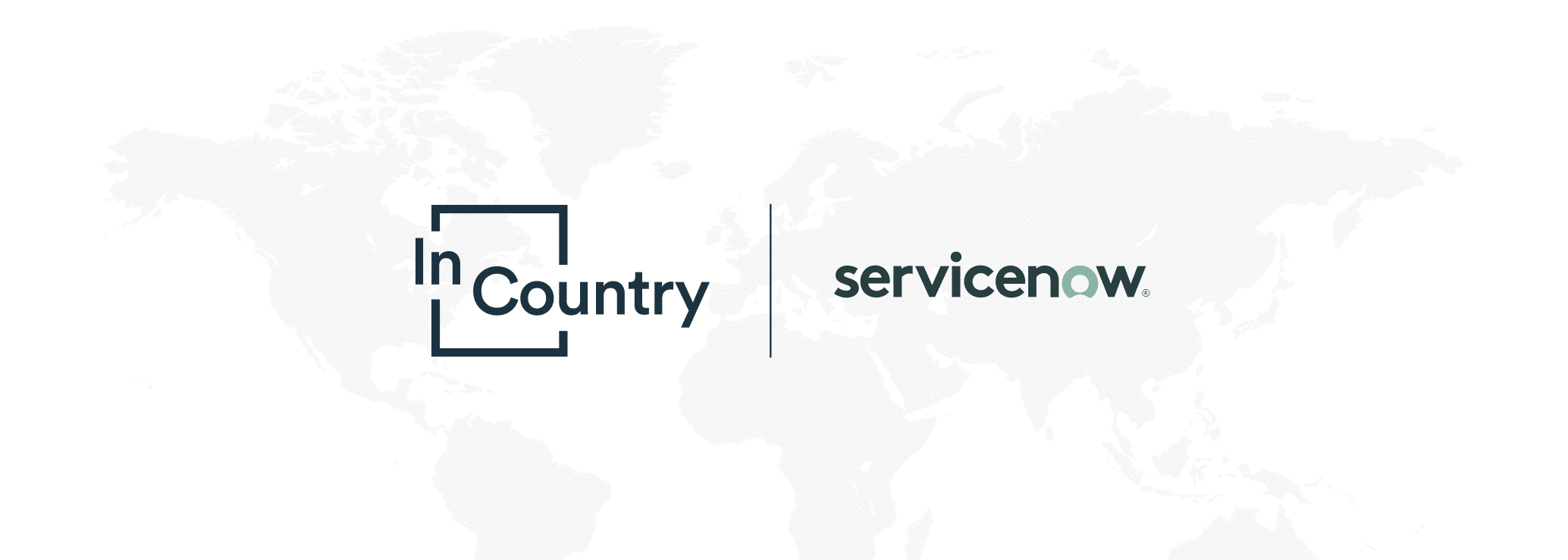The technology landscape is rapidly changing due to the appearance of new SaaS applications and platforms that radically transform the overall approach of running and growing businesses worldwide. This digitalization impacts every sphere of people’s lives, including how their personal data is handled and managed online. Besides implementing effective data protection measures, every company operating worldwide also needs to understand data governance regulations, especially when using large cloud SaaS platforms such as ServiceNow or Salesforce.
The compliance burden imposed by local data protection laws and their requirements can prevent even the most developed business from expanding to new markets that have stringent data regulations. Data protection is no longer a panacea for any SaaS vendor and its customers. The global market has introduced a new term – data governance, which covers all aspects of data management, including the creation of data, as well as its protection, storage, and, of course, disposal upon ending business obligations for a customer.
ServiceNow and business automation
ServiceNow, which digitalizes user experiences and augments employee performance on everyday tasks, is rightfully considered a profound cloud workflow automation platform. World-famous enterprises and corporations have managed to transform their business operations and increase their overall team efficiency by eliminating manual tasks from their employees’ activity pipelines and workflows.
Starting from the IT service management system, the ServiceNow platform has adapted to the continuously changing requirements of its users. It has become an ecosystem that can be used to build a modern and effective business. It leverages the customer experience from the initial point of contact and provision of customer helpdesk services to implement comprehensive solutions for governance, risk, and compliance (GRC) management.
ServiceNow is powered by the latest technology stack that automates, predicts, digitalizes, and optimizes business processes and tasks across an entire enterprise and its departments. This platform has revamped the approach to running modern businesses and providing the optimal user experience for all sorts of common and company-specific operations in the cloud.
Because of that history of success, more and more companies are using the SaaS platform to design and build their team processes and supply their customers with a top-class experience. Many international companies use ServiceNow to serve their customers in different countries, including those in places with stringent data regulations which place significant limitations on how personal data can be processed, stored, and disposed of. All of this dramatically affects worldwide companies that have customers spread out around the globe, as these companies are the primary victims of data governance legislation in SaaS services like ServiceNow.
Compliance issues in ServiceNow
Any SaaS platform working in the cloud encounters a series of challenges that define its architecture and approach to data handling. In years past, companies only had to worry about protecting customers’ sensitive information retained in their systems. Unfortunately, those days are gone forever.
The modern world dictates its own rules for technology companies, and data protection on its own is not the most challenging problem any longer. The second decade of the 21st century has focused people’s attention on how their personal data is managed and used by companies. Many companies and services were quite careless about their customers’ personal data and used it whenever they wanted or shared it with third parties who had no actual business with the original customers. All this created the conditions for the appearance of person protection laws that established the norms and standards on how personal data must be handled and what companies are not allowed to do with it.
Data compliance and data governance have become those pillars that outline requirements not just for the protection of personal data, but also the regulations for storing and accessing personal data. The ServiceNow platform complies with the most advanced data security standards, but the question of data compliance in ServiceNow can appear on the surface if your company operates in multiple regions worldwide.
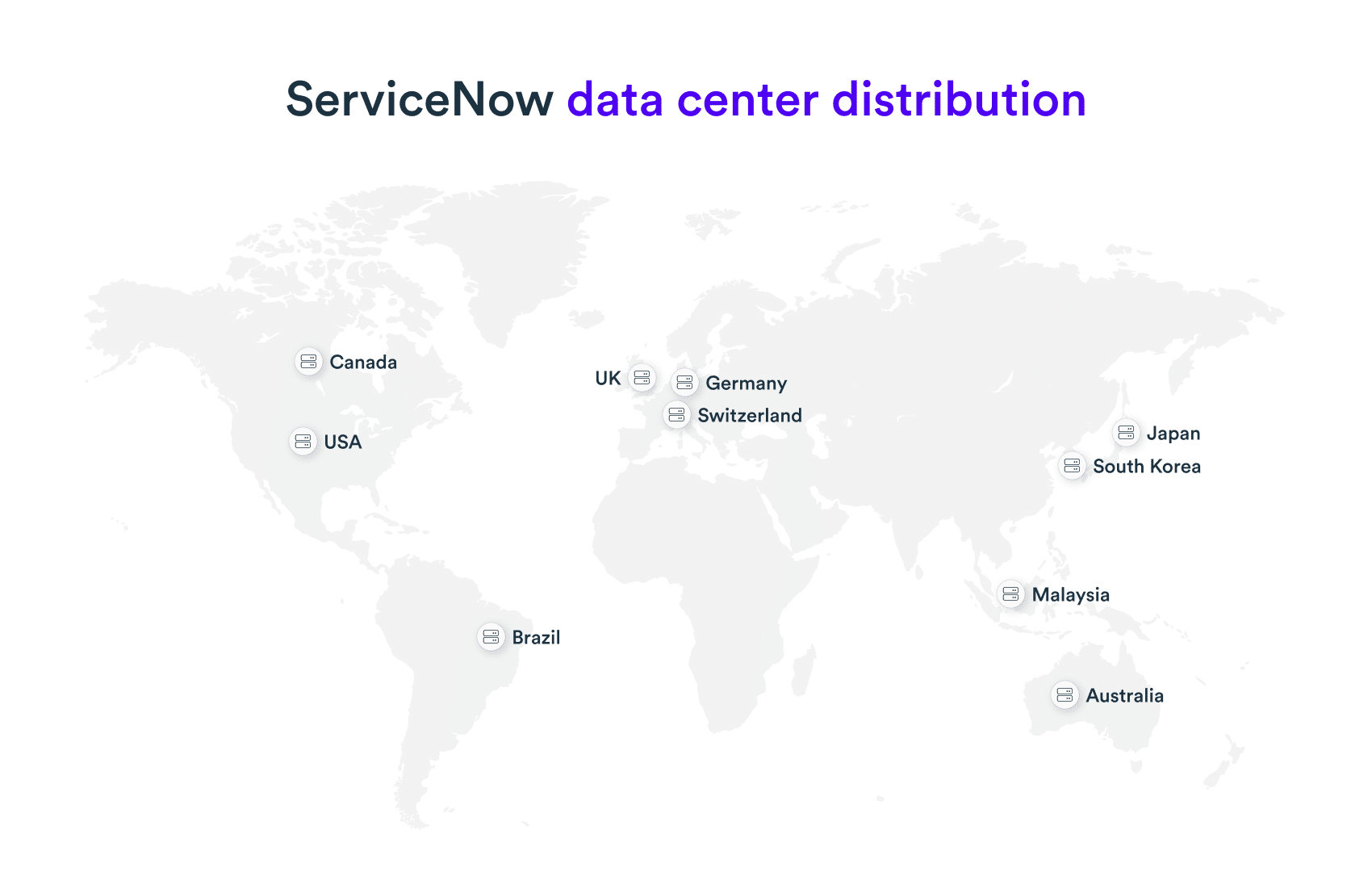
Even though ServiceNow hosts its application data centers in ten countries, this isn’t enough leverage the to remove all probability of companies getting noncompliance fines and sanctions from foreign regulators. The data governance in ServiceNow does not meet stringent data regulations in places such as Russia, China, Saudi Arabia, Turkey, India, and other developing countries.
The critical problem with these countries is that they require localization of their citizens’ personal data within their borders and, in some cases, prohibit even the reading of this data outside the country. This all implies additional data governance and compliance risks for ServiceNow implementations and can harm companies using this ecosystem beyond fines and sanctions.
Addressing compliance issues in ServiceNow
Despite the platform’s data centers residing in multiple countries, this may be insufficient for maintaining compliance in ServiceNow. Some countries have data regulations that forbid the cross-border transfer of personal data, directly prohibiting the usage of ServiceNow for your business within these countries. This dramatically complicates cooperation and collaboration between your employees and customers throughout all stages of your operation pipelines where personal data is processed.
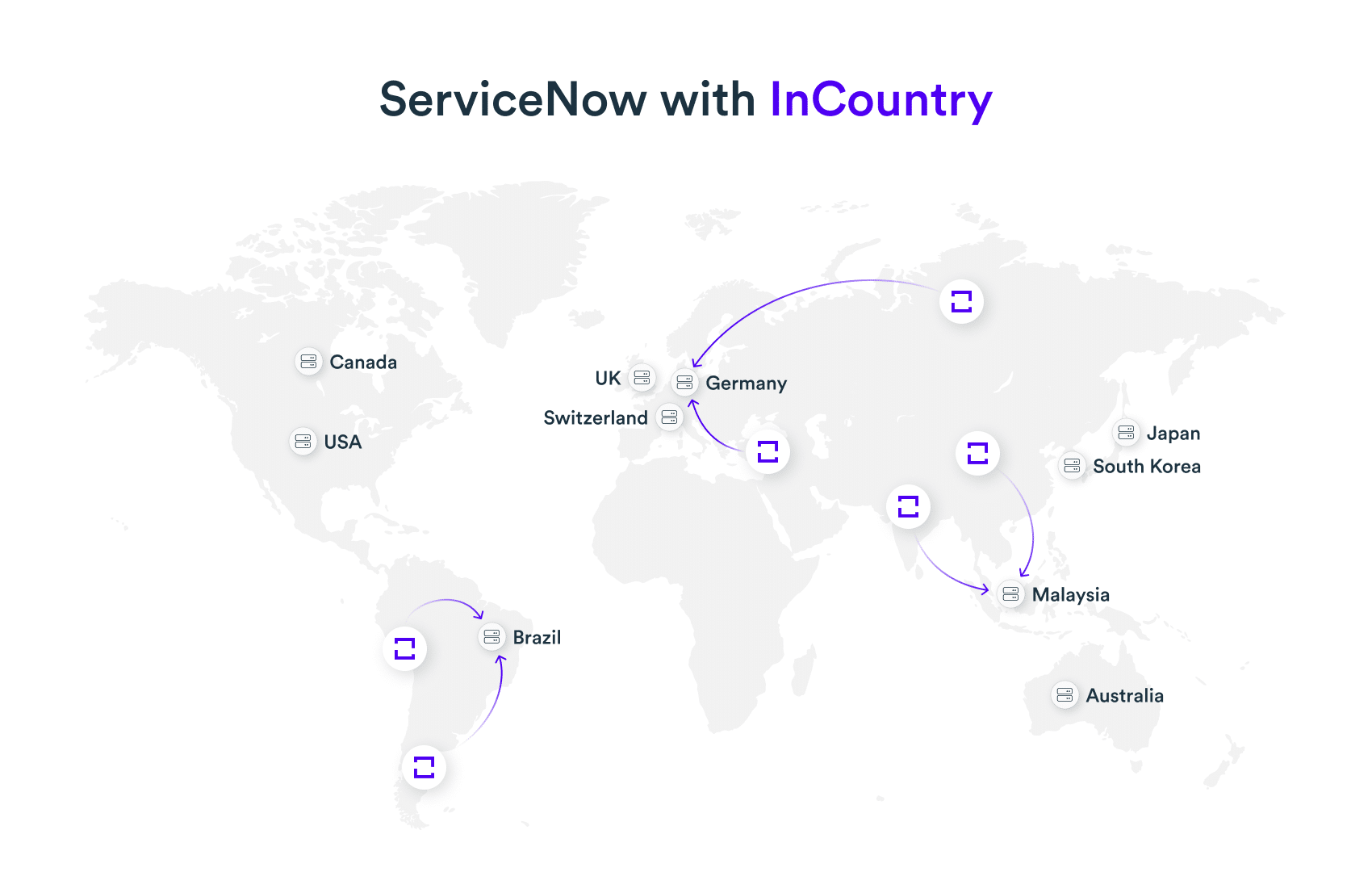
You can consider the ServiceNow On-premise option for data governance, but here you need to acknowledge all the technical and financial costs of going this route. Considering that personal data cannot leave the country of origin, you will have to set up a separate ServiceNow instance in each country, hire dedicated personnel for using each ServiceNow deployment inside the target country, run regular maintenance jobs for this infrastructure, implement custom integrations to communicate data between all ServiceNow instances, and roll out configuration for each host. Such an approach is too ineffective. Besides wasting time and financial resources, it creates additional customer and user experience issues that may potentially cause a decrease in brand loyalty or even increased customer churn.
How then can you properly implement data compliance in ServiceNow? Well, the answer to this question is simple. All you need is the InCountry Data Residency for ServiceNow application and an active subscription to data residency services provided by the InCountry platform.
What is so unique about the InCountry platform? The InCountry platform is primarily focused on data governance in SaaS platforms, ServiceNow in particular. The platform’s data localization and distribution services are unique in the market and consider all the imaginable specifics of data regulations in different countries. Having started with the InCountry platform, you automatically become compliant with local data regulations in over 90 countries, as the InCountry platform was initially designed for this.
Our compliance team has thoroughly reviewed and assessed all the data protection and localization legislation that formed the basis for our data residency-as-a-service platform. The platform also incorporates a network of geographically distributed servers and data centers. To enable further customization, it provides a variety of development and integration tools to address any data compliance challenges, even with SaaS platforms such as Salesforce and ServiceNow.
How the InCountry platform can help with data governance in ServiceNow
InCountry provides a native integration streamlining data compliance in ServiceNow. To get started with the management of compliance in ServiceNow, just install the application from the ServiceNow Store and perform the initial configuration–that’s all. No need to think about cloud providers, designing the network architecture, implementing the data security mechanisms, or fortifying the data communication channels, as all these are already available to you.
The InCountry Data Residency for ServiceNow application supports the two data regulation models that address data protection and localization requirements. The first model is called “redacted” and was designed to comply with the most stringent data regulations, which require only the domestic retention of personal data in the country of its origin and forbid any cross-border transfer of data, even for reading purposes. This means that personal data does not leave the country where it originates and must be stored there in compliance with local data regulations. The other model is called “restricted” and was built to comply with less stringent data regulations that still require the domestic retention of personal data in the country of its origin but do not forbid the cross-border transfer of such data for reading.
In such cases, the personal data of your employees or customers is not physically stored in the ServiceNow Cloud database and fully resides on the InCountry platform in the target country of origin. The InCountry Data Residency for ServiceNow application retrieves this data when you load a record in the form or list views, and writes it back to the InCountry platform upon your updates.
The application also considers your current location and accordingly regulates your access to the requested records. If the data regulation model forbids the viewing of a personal data record outside the country of origin, the application will show the corresponding message to you without revealing the actual record’s values. If the data regulation is not so strict and allows outside viewing, the application will load the actual value for the record with regulated data values. Regardless, only users from the country of origin will be able to modify fields storing sensitive data. Such a mechanism fully addresses the issue with compliance in ServiceNow and gives you a simple way to block the exposure of sensitive data outside the country of its origin, if you require this functionality.
How to get started with InCountry Data Residency for ServiceNow
Getting started with data governance in ServiceNow is not rocket science with InCountry’s solution. First of all, you need to simply install and activate the application from the ServiceNow Store. Once done, you can proceed with the configuration of the application that includes three phases:
- setup of a connection to the InCountry platform
- configuration of the data regulation model and the field rendering mode
- creation of configuration rules.
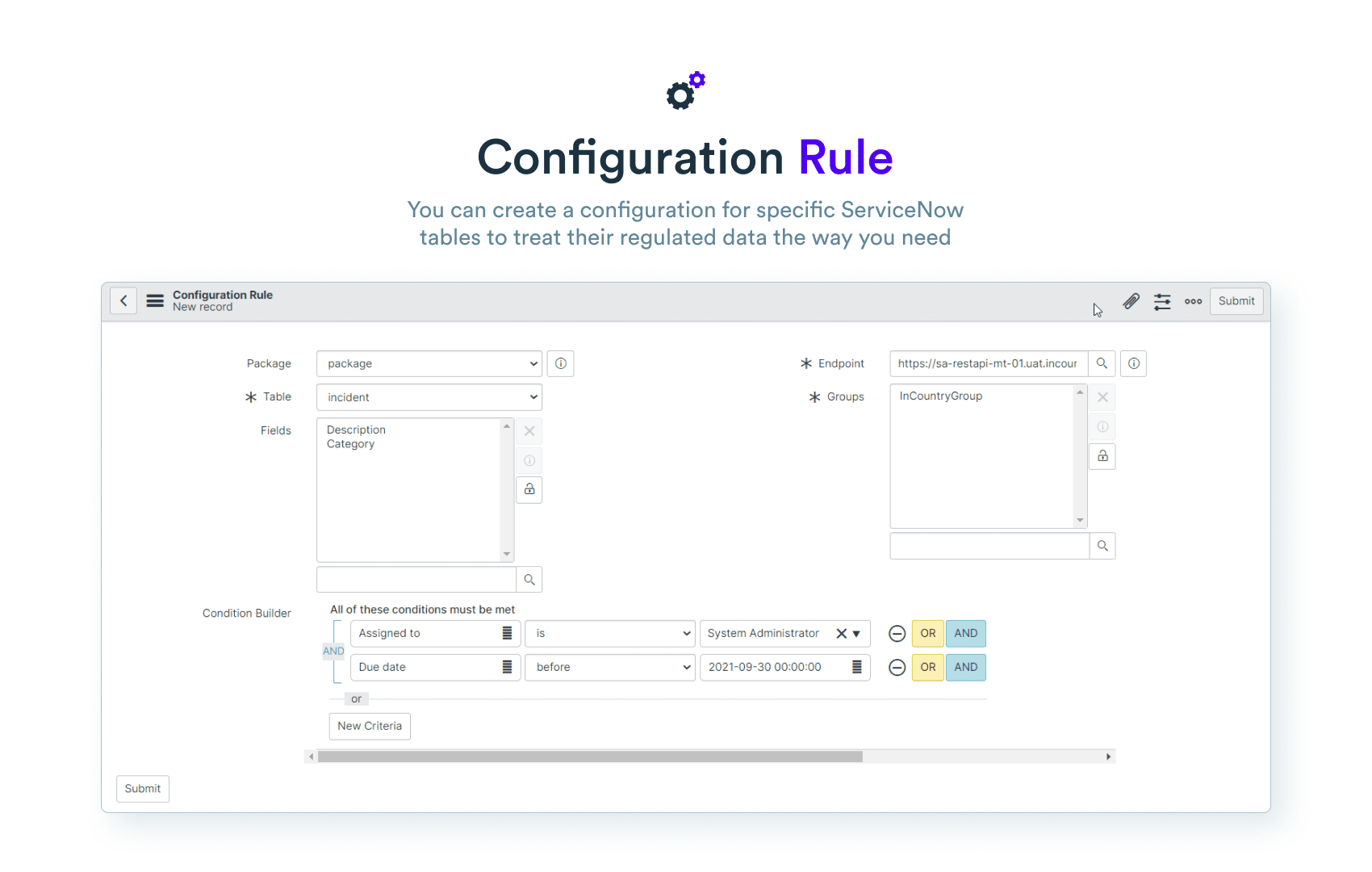
After installing the application, you will receive the connection details and additional metadata required for the setup of a secured connection between the ServiceNow and InCountry platforms. The next thing you need to do is choose the applicable data regulation model and the way the application renders fields containing regulated data. At the last stage, you just create configuration rules that define the ServiceNow tables and protected fields that are processed by the application.
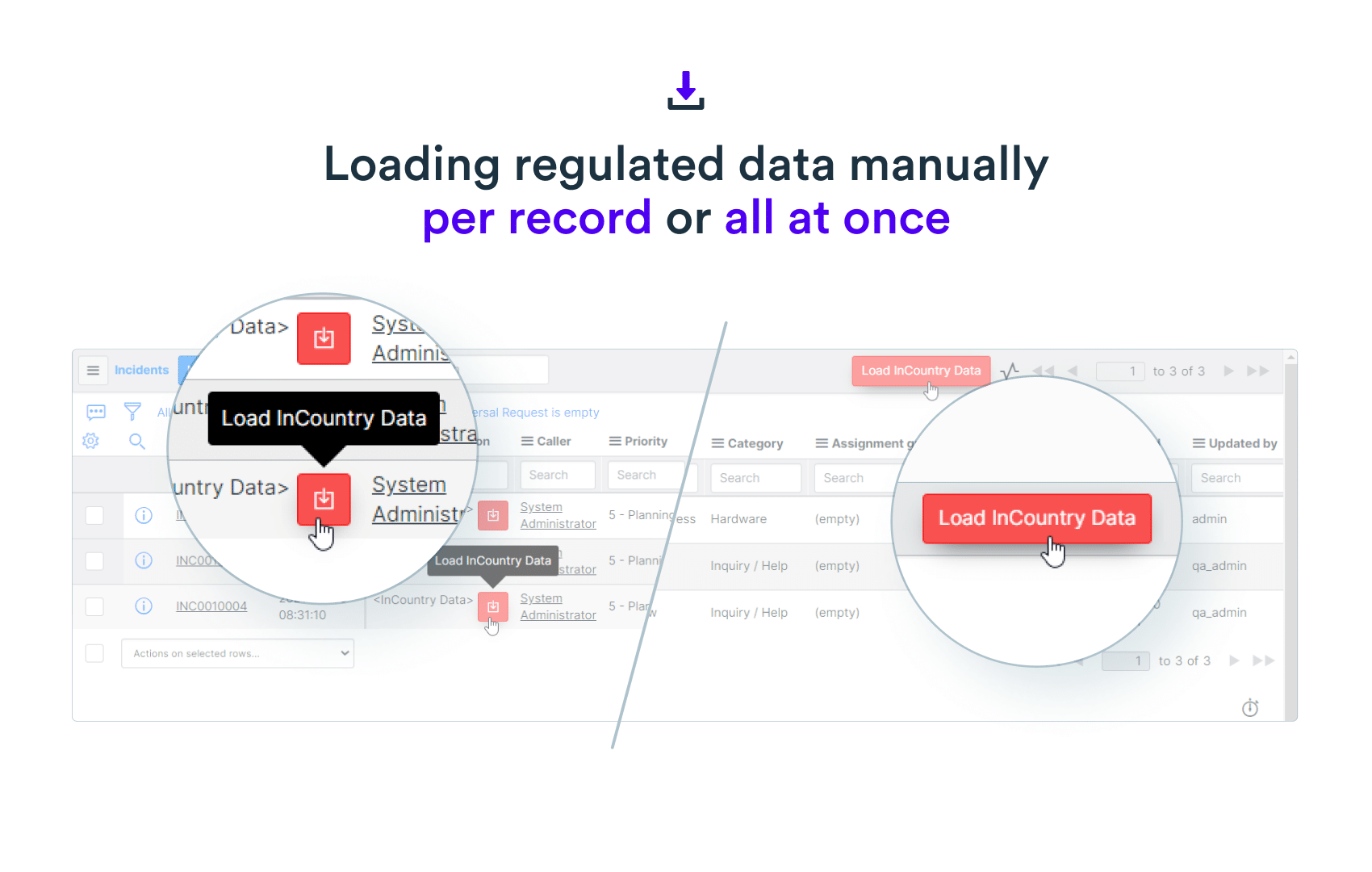
Now you can create records with regulated data and this data will be physically saved to the InCountry platform in the necessary country. The app will hide actual values of protected fields and load them only if users can view them in accordance with their current location and established access restrictions. Besides the protected fields with regulated data, the application also supports the remote storage of attachments with sensitive data on the facilities of the InCountry platform. You no longer need to keep quotes, project proposals, or invoices in ServiceNow and expose them to people who you don’t intend to ever view them. The application handles attachments the same way as protected fields and eliminates compliance risks in ServiceNow with minimal effort from you.
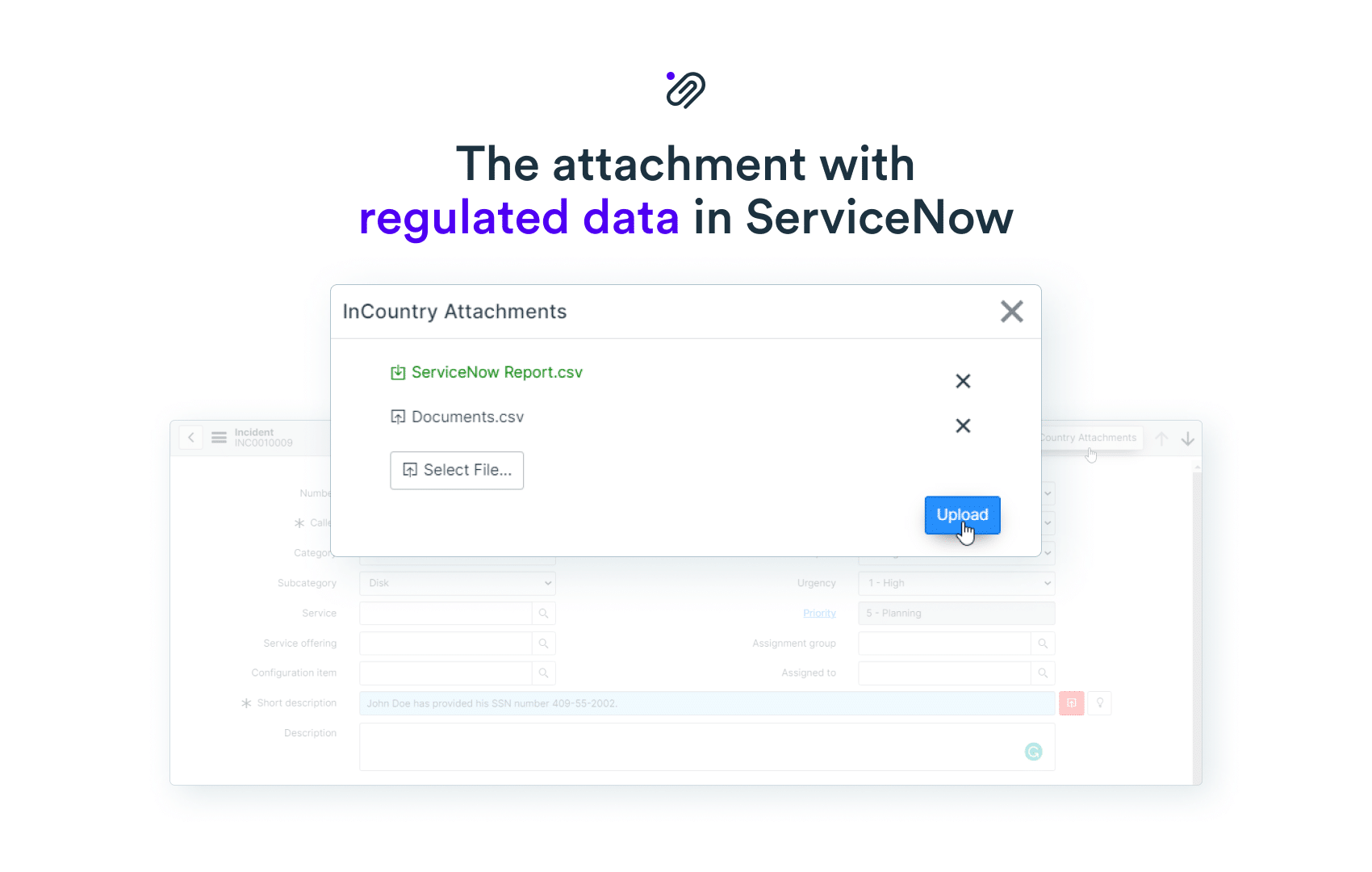
Compliance management in ServiceNow is no longer a pain for you if you use the InCountry Data Residency for ServiceNow application.


